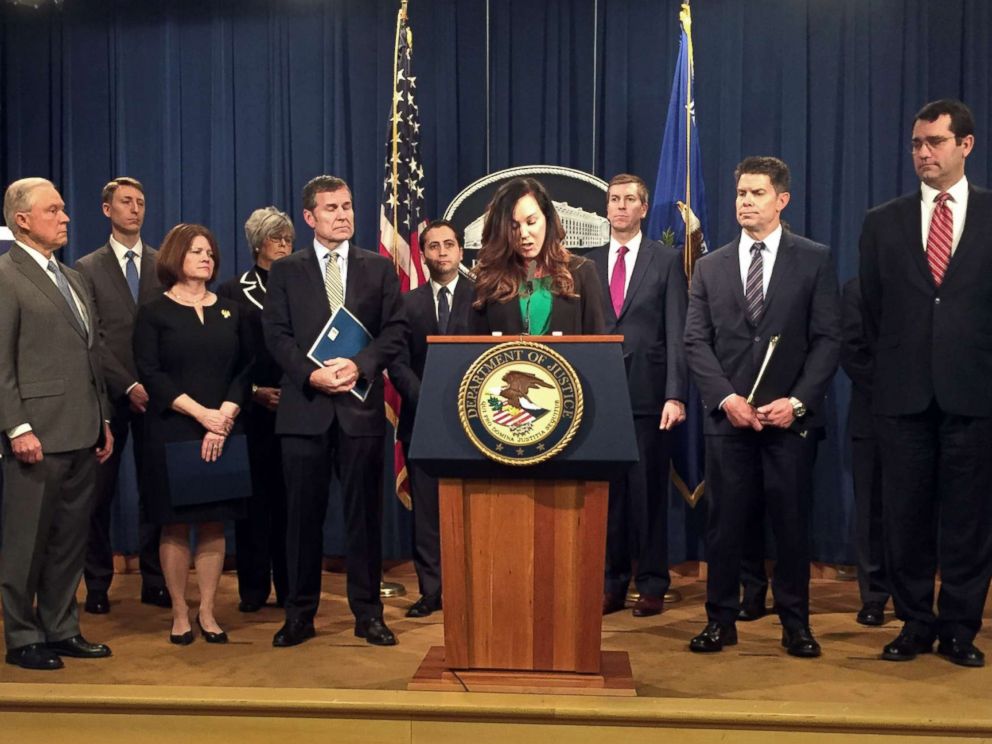Texas woman brought to tears as DOJ targets elder scams
U.S. officials warn scams targeting America's seniors are a "growing threat."
— -- A Texas woman was brought to tears at the Justice Department Thursday, as she recalled how her 82-year-old grandmother committed suicide after being scammed out of her life's savings.
"These individuals preyed on her and on her good heart. What should have been some of the best years and the last chapter of her life was taken from her. She was robbed in every sense," said Angela Stancik of Houston, her voice cracking as attorney general Jeff Sessions, acting FBI deputy director David Bowdich and other top U.S. officials listened beside her.
Stancik came to Washington to highlight what Bowdich called a "serious and growing threat" across the United States: the theft of millions of dollars from America's seniors, who are targeted and tricked by fraudsters around the world.
"That has happened far too often in this country. It is a despicable crime these people are doing. They laugh about their ability to defraud people," Sessions said at a news conference in Washington.
In the past year, more than 200 people have been charged inside the United States for committing elder fraud schemes and dozens more have faced civil actions, according to Sessions.
"These defendants allegedly robbed more than one million Americans of more than half a billion dollars," Sessions said.
Stancik pleaded with the public to "say something to anyone" if they suspect they are being victimized or know someone who is.
"It's not too late. It's not your fault," she said. "Don't be afraid to ask for help."
Stancik said her grandmother, Marjorie Jones of Lake Charles, Louisiana, "had a heart of gold, and she was everything you'd expect a grandmother to be."

Her family didn't realize that their beloved grandmother had been ensnared by a big scam until 10 days before Jones killed herself in 2010.
"When she realized that she had been defrauded, she was extremely devastated, she felt humiliated, and she had literally lost everything," Stancik said, holding back tears. "It pains me to say this, but she took her life because of this incident. The events leading to my grandmother's death have scarred my family and left us all in shock. The pain and the loss from her tragic death surrounds us all daily."
Pretending to represent a sweepstakes, scammers told Jones that she had won a big prize, and all she had to do was send in money to cover taxes and fees.
In many cases, scammers send letters in "attention-grabbing envelopes designed to lead a person to believe they actually won," said Guy Cottrell, the U.S. Postal Inspection Service's chief inspector. Millions of such letters are sent around the world, according to Cottrell.
"However, no prize is ever delivered. No prize ever existed," he said. And "once the scammer starts, the demands are relentless. ... These fraudsters don't limit themselves to just lies anymore. Their efforts to keep victims in line become increasingly ruthless. They don't hesitate to threaten, coerce or resort to psychological intimidation."
Jones ultimately sent all of her money to scammers - she later had to borrow money from family members, took out all of her life insurance, and then tragically committed suicide.
She had $69 in her bank account when she died.
Last month, the Justice Department ordered all 94 U.S. Attorneys' offices across the country to each designate an "elder justice coordinator," charged with trying to "customize" a strategy to protect seniors in their districts, according to Sessions. Since then, the Justice Department’s Consumer Protection Branch, along with U.S. Attorneys’ offices, have filed cases against more than 40 defendants for their alleged role in defrauding hundreds of thousands of Americans, Sessions said.
And over the past week alone, more than 100 inspectors from the U.S. Postal Inspection Service executed search warrants in 14 locations across the country, according to Cottrell.
Now, the Justice Department is going after not just the scammers themselves but also what authorities called the "enablers," the people who help write text for the letters, the people who help print the letter, and the people who provide mailing lists for scammers to target.
The FBI and its partners are targeting a "wide range of crimes" against seniors, including Ponzi schemes, romance and lottery scams, and mass-marketing schemes, according to Bowdich.
"This is an incredibly important issue for all of us in government, and everyone in this room has family members that could be taken advantage of through these types of schemes," Bowdich told the reporters and government officials gathered inside the Justice Department.




